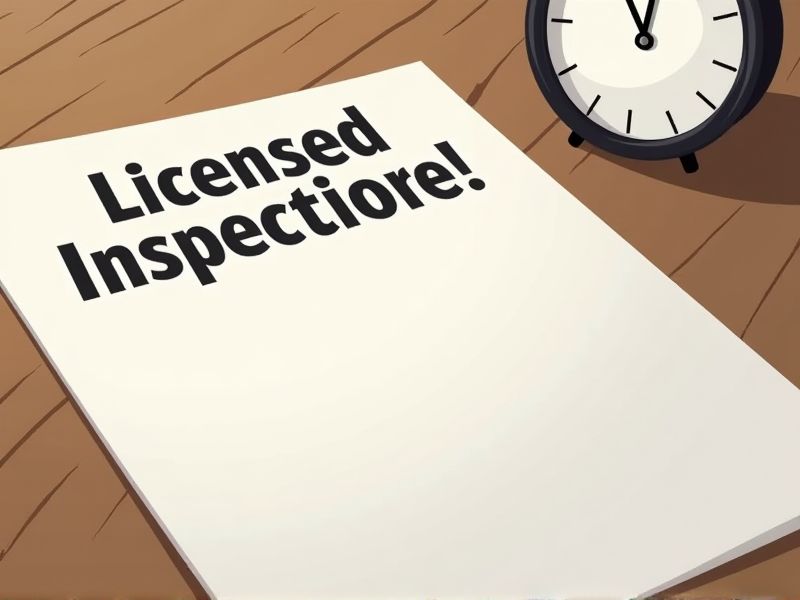
Licensed Home Inspectors assess the structural integrity and safety of residential properties, ensuring they meet local codes and standards. Certifications authenticate a professional's expertise and knowledge in identifying potentially hazardous conditions. Without proper certifications, the credibility and reliability of an inspector's evaluation may be questioned, potentially leading to legal liabilities. **Below are some essential certifications you might require to become a Licensed Home Inspector.**
State Home Inspector License
State home inspector licenses ensure standards and regulations are consistently met, providing quality assurance for consumers. Licensing processes offer formal verification of an inspector's knowledge and skills, which reduces the risk of oversight during inspections. Consumers gain confidence in hiring decisions when inspectors hold state-recognized credentials. Licensed inspectors benefit from elevated professional credibility and potential access to insurance advantages.
National Home Inspector Examination (NHIE) Certification
The NHIE certification ensures a licensed home inspector possesses the critical knowledge and skills required for accurately evaluating a property's condition. Passing this examination standardizes inspection practices across the industry, enhancing public trust in inspection reports. Many states require the NHIE for licensure, aligning local practices with national benchmarks and ensuring consistency. Having NHIE certification can elevate a professional's credibility, attracting clients who seek reliable and competent inspection services.
InterNACHI Certified Professional Inspector (CPI)
The InterNACHI Certified Professional Inspector (CPI) provides a standardized benchmark that ensures a home inspector meets rigorous industry standards. Because of the CPI credential, homebuyers can trust inspectors to deliver comprehensive assessments backed by extensive training and education. Home inspectors with CPI certification often gain a competitive edge in the market as clients prioritize certified expertise. The certification also supports inspectors in staying current with industry updates, helping maintain reliability and accuracy in their evaluations.
ASHI Certified Inspector Certification
ASHI Certified Inspector Certification enhances credibility, often leading to increased client trust and business opportunities. Rigorous standards and peer reviews associated with ASHI ensure inspectors meet high-quality benchmarks. Many insurance providers offer favorable rates to ASHI-certified inspectors, reducing business costs. Networking opportunities within ASHI can lead to professional growth and industry updates, keeping inspectors informed on latest practices and tools.
National Radon Safety Board (NRSB) Radon Measurement Specialist Certification
Home inspectors with NRSB Radon Measurement Specialist Certification have validated expertise in detecting and analyzing radon levels, ensuring accurate assessments. Radon is the second leading cause of lung cancer, making accurate testing essential for the safety of homebuyers. Certified inspectors meet specific training and testing standards, which increases trust and credibility with clients. The certification helps inspectors comply with regional regulations that mandate radon testing, aligning their practice with industry standards.
Lead-Based Paint Inspection Certification
Lead-based paint inspection certification is crucial for licensed home inspectors because it ensures they can accurately identify and assess potential health hazards related to lead exposure in homes. Exposure to lead-based paint is known to cause serious health issues, particularly in children, such as developmental delays and cognitive impairments. Having this certification enhances an inspector's credibility and trustworthiness, which can influence a homeowner's willingness to hire them. Legal requirements in many regions mandate certified inspectors, as federal and state regulations aim to minimize health risks associated with lead exposure.
Mold Inspection Certification
Mold inspection certification equips home inspectors with specialized knowledge, enabling them to accurately identify and assess mold-related issues. Without this certification, home inspectors may miss signs of mold growth, potentially leading to health risks for homeowners. Certification assures clients that the inspector is trained to handle mold problems, which can impact property value and habitation safety. Mold inspection training enhances the inspector's credibility and marketability in a competitive industry.
Infrared Thermal Imaging Certification
Infrared thermal imaging certification enhances a home inspector's ability to identify potential issues like moisture intrusion, electrical problems, and insulation deficiencies that are not visible to the naked eye. This skill leads to more comprehensive assessments, increasing client trust and credibility. Certified inspectors can offer higher-value services, often leading to increased business opportunities and revenue. Training in thermal imaging also helps inspectors stay competitive in the market, as more clients seek advanced diagnostic techniques.
NICET Certification in Building Inspection
Licensed home inspectors often seek NICET Certification in Building Inspection as it validates their expertise and knowledge in the field. This certification improves credibility with clients and real estate professionals, leading to increased trust and potential business growth. The NICET credential encourages a higher standard of practice by promoting continuous education and staying updated with industry standards. Certification can also enhance career opportunities, providing a competitive edge in a crowded market.
Advanced Roof Inspection Certification
Advanced Roof Inspection Certification is critical for licensed home inspectors as it enables them to accurately assess complex roofing issues that basic training might miss. More comprehensive knowledge reduces liability and enhances the inspector's credibility among clients. Complex roof systems and diverse materials require specialized expertise to ensure safety and longevity. Demand for certified inspectors is likely to increase with evolving building standards and client expectations.
Summary
By obtaining additional certifications, you enhance your credibility as a Licensed Home Inspector. This leads to greater client trust and a potential increase in clientele, as certified professionals are often sought after for their expertise. With specialized knowledge, you also expand the range of services you can offer, making your business more competitive. Consequently, this can result in higher income opportunities and career advancement within the industry.
